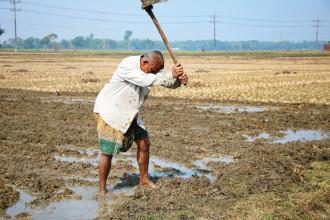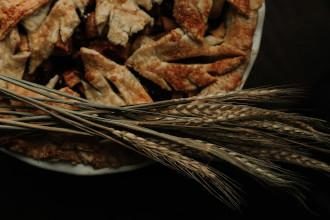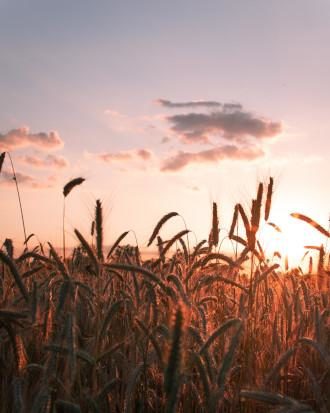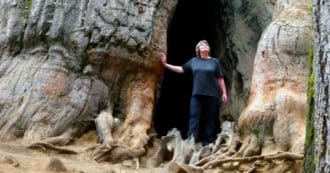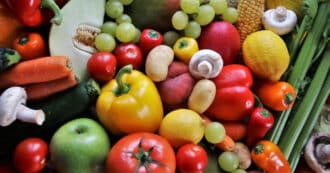By Ilana Stein – In Genesis 3:19 God pronounces Adam’s punishment for eating from the Tree of Knowledge of Good and Evil. While this verse is short, like all of the Bible, it contains deeper worlds in every letter and word.
Let’s unpack some of the meanings contained within Genesis 3:19. We’ll begin with an idea from the seminal work, Eco Bible.
Eco Bible on Genesis 3:19
Genesis 3:19 – In the sweat of thy face shalt thou eat bread, till you return to the ground; for out of it wast thou taken: for dust thou art, and unto dust shalt thou return (King James Version).
The Torah reminds us that we are made up, ultimately, of stardust, as is the rest of creation. We share that origin with every substance in the universe. Terrestrial life on our planet absorbs most of its vitality from a six-inch layer of topsoil. Even though we operate daily on the assumption that we are separate from the earth, this verse reminds us in fact we are intricately connected: “For dust you are, and to dust you shall return.”
Working For Our Food – A Change in Culture
In this verse, the Bible records a change in the way that human societies would obtain food. While in the Garden of Eden, Adam and Eve could gather fruit from any tree (except one); they received all the food they needed without much effort.
However, after eating from the Tree of Knowledge of Good and Evil, they became farmers instead of gatherers. Humanity entered a new reality: what is known as “the agricultural revolution,” where farming became the dominant lifestyle.
This lifestyle was hard work – as expressed in “the sweat of thy face” (or “sweat of your brow” in the New International Version).
The Effort that Goes into Making Bread
Across the Bible, bread is the quintessential food. In other words, it represents all food. Our verse in Genesis is no exception, but it also echoes human history. Wheat was one of the first plants to be ‘domesticated,’ planted year after year, beginning some 10,000 years ago.
Bread making is even older than that and was a process that took a lot of time and energy. After harvesting, there was winnowing and grinding the kernels, making them into a flour, then adding water (and eventually yeast) and kneading the mixture. All this was necessary before baking it in the ground and later, in a free-standing oven.
As wonderful as bread is, studies show that making it takes more energy than merely gathering fruit does:
Growing plants and tending animals increased yields per hectare, notably the caloric return, although doing so necessitated greater labor inputs and investments in the land itself. Early agriculture’s toll on human health.
While many innovations occurred through the ages, the Industrial Revolution brought about a sea-change in how we make bread: the invention of the automated flour mill. This and other inventions have cooled the “sweat of your face” somewhat.
Coming from Dust and Returning to Dust
Adam’s punishment included eating bread “till you return to the ground; for out of it wast thou taken: for dust thou art, and unto dust shalt thou return (King James Version).”
We can see Adam and his descendants working the earth, their eyes drawn downwards to the dirt or soil which they ploughed, and their thoughts naturally turning to their origins and mortality.
They would remember the verse of Genesis 2:7: And the LORD God formed man of the dust of the ground, and breathed into his nostrils the breath of life; and man became a living soul (King James Version). Genesis 3:19 deliberately connects the two in our consciousness.
Our Relationship With the Earth
The name “Adam” comes from the Hebrew word “adamah” – land or ground. Our physical bodies are made of the same minerals, nutrients and other elements as the earth itself, and at the end of our lives, they will be recycled, returning to the place they came from.
We are made of earth, and we are of the earth. This intimate connection should inspire us to connect to and care for our ‘brethren’ – after all, in Genesis 2:15, the Bible commands us to work and protect the earth.
Rabbi Joseph B. Soloveitchik writes that this verse expresses “the unique relationship that prevails between man and earth. First, the earth claims man; he was taken out of Mother Earth, and to her he must return (Emergence of Ethical Man). “
He describes the mitzvah (commandment) of burial as a demand that the earth itself makes on human beings – “She insists upon the return of a part of her own self. As soon as the Ruah Elokim (the spirit of God) departs man, his inanimate body must be delivered to its rightful owner (Ibid.).”
A Return to Harmony
The verse can be seen in a different way.
Instead of it being a curse of death as we’ve mentioned above, it may be a promise. Instead of being seen as “dust”, the word ‘adamah’ can be translated as ‘the earth.’
We have treated the earth shabbily over thousands of years. Perhaps one day, we will understand just how closely we are intertwined, and we will return to the earth and our former harmonious relationship.
There is a beautiful symbiotic relationship between the earth and humanity – between adam (humanity) and adamah (earth): The earth serves us, granting us food and abundance. We in turn need to look after the earth. Only then will our relationship blossom.
* Featured image source


